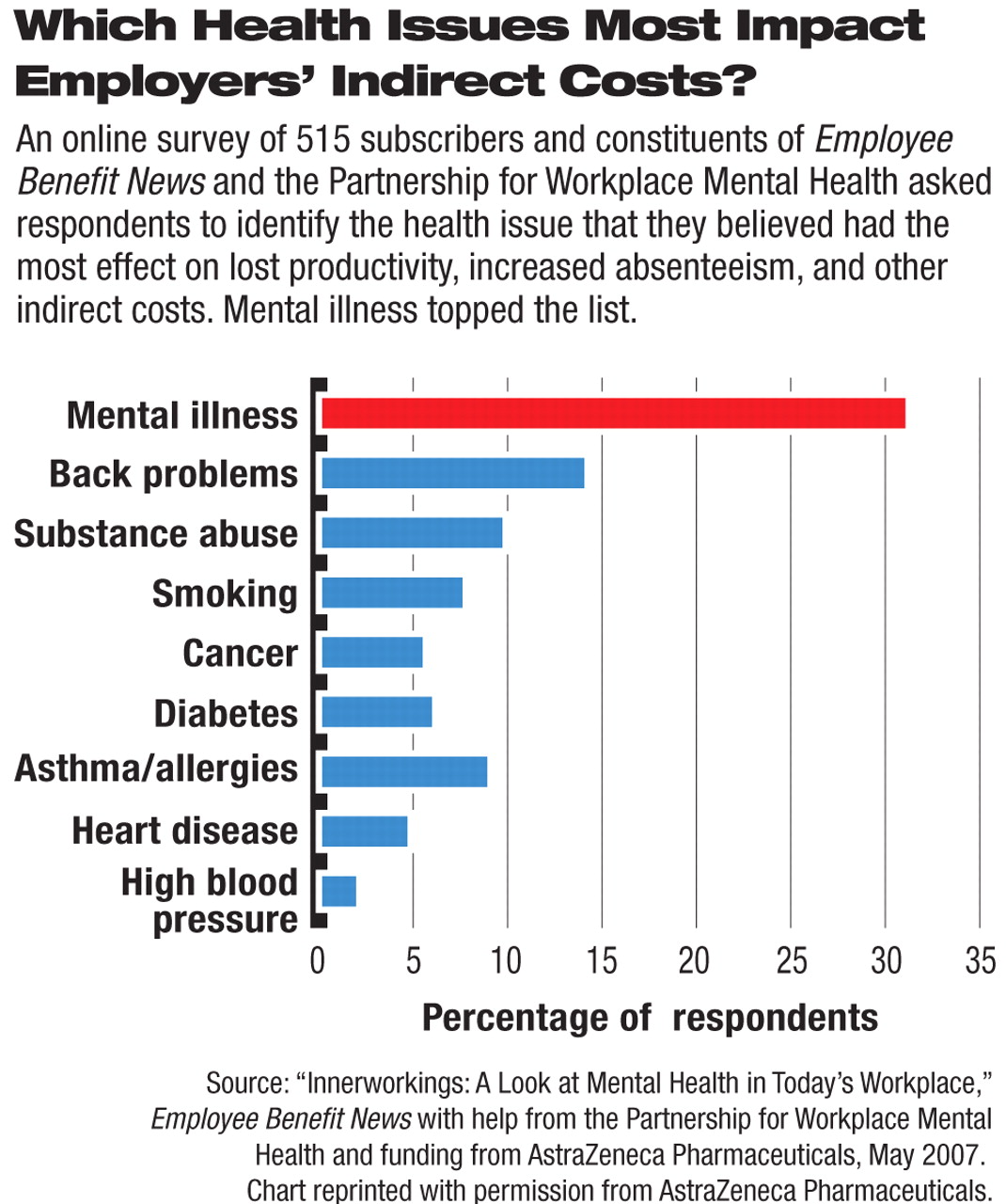Nearly one-third of human resource (HR) executives who participated in a nationwide survey on mental health identified “mental illness” as having a more negative effect on indirect medical costs than any other medical illness.
Yet only 15 percent of these same executives said that their managers were trained in recognizing a mental health problem or in suggesting that an employee seek treatment.
Employee Benefit News, considered a must-read publication for HR professionals with a circulation of more than 60,000, conducted the survey with help from the Partnership for Workplace Mental Health, a program of the American Psychiatric Foundation with funding from AstraZeneca Pharmaceuticals. The results were published in May in “Innerworkings: A Look at Mental Health in Today's Workplace” (see
Employees Still Getting Inadequate MH Care).
Both Employee Benefits News and the Partnership for Workplace Mental Health posted the survey results on their Web sites and distributed it via e-mail to subscribers and business contacts, primarily corporate executives with HR, benefits, and/or financial management responsibilities; 515 individuals representing large and small companies responded.
Employee Benefit News broke the news on the front page of its May issue, and industry publications quickly picked up the story. Senior Editor of Employee Benefit News Lynn Gresham said, “HR leaders are clearly concerned about the impact mental illness is having on their companies. They see the waste of potential and are looking for solutions.”
Opportunity for Psychiatrists
Alan Axelson, M.D., co-chair of the Advisory Council for the Partnership for Workplace Mental Health and a director of the foundation, told Psychiatric News, “These findings demonstrate that businesses are aware of the importance of mental health issues in maintaining a productive workforce and the effectiveness of treatments for psychiatric illnesses. Psychiatrists in each community need to establish partnerships with local businesses to address barriers that interfere with access to effective treatment. Offering employers the opportunity to join the Partnership for Workplace Mental Health is a great opening step.”
Clare Miller, director of the partnership, concurred. “We're pleased that attitudes about mental illness in the workplace are improving,” she said, “but it's clear that employers need more assistance from the mental health community in educating their employees and managers about mental illness and the effectiveness of treatment.”
Fortune 500 Companies in Partnership
“We know businesses look first to each other to find solutions,” Miller said, “and one of the partnership's first steps was to establish relationships with companies that are leaders in developing innovative mental health programs—companies such as Coca-Cola, DuPont, JPMorganChase, and Pitney Bowes.”
The Partnership for Workplace Mental Health is developing a Web-based database of innovative mental health programs that companies have already undertaken. The database will be online this fall.
A primary goal of the partnership is to develop practical tools for business. Its most recent publication, A Mentally Healthy Workforce: It's Good for Business, meets that objective by including a three-phase guide for companies to evaluate, construct, and strengthen a corporate mental health program.
In addition, the partnership has convened a group of stakeholders in psychiatric disability and formed a task force to develop tools that will facilitate an employee's return to work. Plans are under way to run a pilot test of these tools at one of the major big-box stores in the United States.
Alan Langlieb, M.D., M.B.A., chair of APA's Committee on APA/Business Relations, said, “We are encouraged that more and more business leaders are turning to the same page as the mental health community. We look forward to working with companies to provide high-quality services to employees.”
“Innerworkings: A Look at Mental Health in Today's Workplace” is posted at<www.workplacementalhealth.org>. More information about the partnership and its program is available by calling Mary Claire Leftwich at (703) 907-8561. ▪

